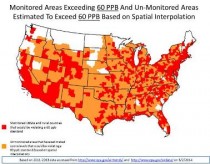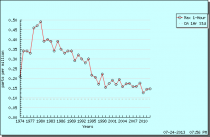Guest Post by Willis Eschenbach, WUWT
Thanks to the blog of the irrepressible Hilary Ostrov, a long-time WUWT commenter, I found out about a poll gone either horribly wrong or totally predictably depending on your point of view. It’s a global poll done by the United Nations, with over six million responses from all over the planet, and guess what?

UN global poll Enlarged
The revealed truth is that of the sixteen choices given to people regarding what they think are the important issues in their lives, climate change is dead last. Not only that, but in every sub-category, by age, by sex, by education, by country grouping, it’s right down at the bottom of the list. NOBODY thinks it’s important.
Now, people are always saying how the US is some kind of outlier in this regard, because polls in the US always put climate change down at the bottom, whereas polls in Europe generally rate it somewhat higher. But this is a global poll, with people chiming in from all over the planet. The top fifteen countries, in order of the number of people voting, were Mexico, Nigeria, India, Pakistan, Sri Lanka, Yemen, Philippines, Thailand, Cameroon, United States, Ghana, Rwanda, Brazil, Jordan, and Morocco ...so this appears to be truly representative of the world, which is mostly non-industrialized nations.
So the next time someone tries to claim that climate change is “the most important challenge facing the world”....point them to the website of the study, and gently inform them that the rest of the world doesn’t buy that kind of alarmist hogwash for one minute. People are not as stupid as their leaders think, folks know what’s important and what’s trivial in their lives, and trying to control the climate is definitely in the latter group.
The poll will be open until 2015, so you can register your own priorities…
My regards to everyone, I’m off for a staff Christmas dinner with the workmates of the gorgeous ex-fiancee, life is good.
w.
----------
EPA Proposes Potentially Costly New Ozone Regulations
Jack Gerard, API
Dear Friend,
Strict new ozone standards announced by the Environmental Protection Agency (EPA) could be the most expensive regulation ever imposed on the American public. The current standard of 75 parts per billion (ppb)—the most stringent ever enacted when it was issued in 2008 - hasn’t been fully implemented yet. Even so, air quality has improved dramatically over the past decades and will continue to improve as EPA and states implement existing standards.
EPA’s move to set standards between 65 and 70 parts per billion, and to take comments on standards as low as 60 ppb, is not supported by science. A current review of health studies shows no compelling evidence that more stringent standards are needed when the current standards already protect public health.

Emissions Map. See impact on jobs and economy by state of the new regulations in this interactive program.
The cost to the economy, jobs and consumers could be significant. A recent study from NERA Economic Consulting commissioned by the National Association of Manufacturers (NAM) shows that further tightening ozone standards to the lowest level EPA is considering could result in:
A loss of $3.4 trillion in U.S. GDP from 2017 to 2040
2.9 million fewer job equivalents per year on average through 2040
Increased natural gas and electricity costs for businesses and families across the country
Standards that would impose unachievable emission reduction requirements on virtually every part of the nation are clearly a misguided overreach. Even pristine areas with no industrial activity such as national parks could be out of attainment. Operating under such stringent requirements could stifle new investments necessary to create jobs and grow our economy. The right policy choice is to implement the current standards and allow air quality to continue to improve.





